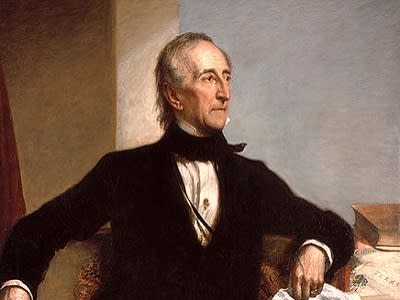An early President’s great leap of faith
On April 4, 1841, newly inaugurated President William Henry Harrison died just 30 days after taking the office. What happened next was a constitutional crisis that ended with a bold move taken by a President generally considered one of the worst in history.
John Tyler was literally an afterthought in the bitterly contested 1840 campaign between Harrison and the incumbent Martin Van Buren. Today, he’s best known as the last part of the campaign slogan, “Tippecanoe and Tyler, too.”
Tyler wasn’t in Washington when Harrison fell ill; he had retired back to his plantation in Williamsburg, Virginia. When informed that the President was sick, the Vice President thought it would be disrespectful to return to the capital.
On April 5, two riders appeared at Tyler’s doorstep with news that the President was dead and he needed to return to Washington immediately. Tyler calmly finished his breakfast and then made a one-day journey to the capital.
Tyler didn’t take the oath then as President because no one in Washington knew what to do next. The Constitution was very unclear about the concept of presidential succession- a fact that party leaders like Henry Clay, Daniel Webster and Tyler soon realized.
Article II, Section 1 of the Constitution stated that in the case of death, resignation, or inability, the presidency “shall devolve on the Vice President.” But it was unclear whether the Vice President would be the “acting” President until another President was elected, or if Tyler simply became President. Or would there need to be a new election immediately, or would Tyler serve in some capacity until the next scheduled election in 1844?
In some ways, Tyler was more qualified to hold the office than Harrison. He had served as a member of both houses of the Virginia legislature, in both houses of the U.S. Congress, as governor of his state, and briefly as vice president of the United States.
Webster then reached out to the Supreme Court, with a message to its clerk, asking for an interpretation about the presidential succession process. Supreme Court Chief Justice Roger Taney refused to become involved in what could potentially be a constitutional dispute at the highest level.
Tyler didn’t want to take the presidential oath, believing that his vice presidential oath covered the eventuality of his ascension to the presidency. His cabinet and many other officials disagreed, and Tyler decided to take the oath in public on April 6, 1841.
When Tyler met with Harrison’s cabinet soon after the event, many members called him the “Vice President acting as President.” He was also informed by Webster that the cabinet decided administration issues by a vote, with the President only having one vote in the process.
Tyler quickly ended that practice.
“I am the President, and I shall be held responsible for my administration. I shall be pleased to avail myself of your counsel and advice. But I can never consent to being dictated to as to what I shall do or not do. When you think otherwise, your resignations will be accepted,” Tyler said.
Tyler’s reluctance to be a caretaker President soon led to criticisms and a new popular nickname, “His Accidency.”
And in May 1841, Tyler had to deal with another significant issue: Would Congress recognize him as the President? The House debated the question on May 31 and it agreed to recognized the Vice President as President. The Senate also had some doubts, but it sooner agreed with the House, and President Tyler fully assumed his office.
For the rest of his presidency, Tyler battled with the Whigs (the party that got him elected), was kicked out of the party, and used the veto 10 times.
Today, Tyler’s legacy, in addition to the Harrison campaign slogan, is the 25th Amendment. The amendment was adopted in 1967 and part of it codified what was known as the Tyler Precedent.
Tyler’s decision in 1841 to assume the full role of President upon the death of his predecessor was used eight times to assure that the office of President was held legally, until the 25th Amendment made the practice officially part of the Constitution.
Scott Bomboy is the editor in chief of the National Constitution Center.
Recent Constitution Daily History Stories
Controversial trailblazer: Remembering the first woman in Congress
Can you pass a basic 10-question quiz on the presidents?
A tale of a giant cheese, a loaf of bread and the First Amendment



